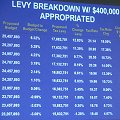- By Dan Veaner
- News
 Print
Print  The Lansing Board of Education (BOE) starts each year with a 'rollover budget' figure, the amount it will cost next year to do everything the district did this year. Then it adds or subtracts based on program needs, physical plant, growth, and tax impact to come up with a budget for next year. That's how it works in times of prosperity. But with severe state aid reductions this year and looking ahead several years, and reduced federal money, the Lansing BOE is looking at an approximately $2 million gap.
The Lansing Board of Education (BOE) starts each year with a 'rollover budget' figure, the amount it will cost next year to do everything the district did this year. Then it adds or subtracts based on program needs, physical plant, growth, and tax impact to come up with a budget for next year. That's how it works in times of prosperity. But with severe state aid reductions this year and looking ahead several years, and reduced federal money, the Lansing BOE is looking at an approximately $2 million gap."This is the calm before the storm," Supernintendent Stephen Grimm said at Monday's BOE meeting. "In the next budget presentation on March 22, we will unveil where we are going to close our revenue gap. More specifically, what many people are concerned with are cuts. What we're finding is that the revenue gap is increasing. There is no way you can cut that much money without cutting people."

BOE President Anne Drake, Superintendent Stephen Grimm,
BOE members Michael Cheatham and Glenn Cobb contemplate
a $1.9 million budget gap
BOE members Michael Cheatham and Glenn Cobb contemplate
a $1.9 million budget gap
There was some qualified good news. School officials are estimating that the district will spend $450,000 less than budgeted this year. $400,000 of that can be used to help mitigate next year's budget gap.
Business Administrator Mary June King showed the BOE a summary of the rollover budget and how the decrease in revenues will impact it. She presented charts showing how various levels of cuts will impact the tax levy, ranging from a 4.07% rise to over 19% if the $400,000 is appropriated.
Grimm also unveiled what he called 'Diversified Revenue Implementation Planning (DRIP), a method of planning reserve and other revenue use over the course of three years. He said that planning over multiple years helps preserve programs and mitigate unexpected drops and rises in revenue in any given year.
But DRIP will only cover one million dollars, leaving district taxpayers to make up the rest, or forcing the district to make nearly a million dollars of cuts in the rollover budget.
"The state revenue problem is very real, and it's a problem on the national level," Grimm said. "We have to respond, though, because now the revenue problem is our problem whether we were party to (creating) it or not. We have to cut our expenditures to bring them in line with the revenues. We have to look at all aspects of our program and figure out how to bring that into something that is reasonable."

David Dittman
"At the current budget, without taking the $400,000 out, it would be a 21.71% increase in the tax rate," he said. "With the $400,00 in, it's a 19.05% increase in the tax rate. It's a $1.9 million dollar difference. If you fund $1 million with the DRIP method we still $900,000 difference between what we're spending and what we're going to have to tax the people. That translates into well over a 10% increase."
Dittman recommended a four-year systematic drawdown in expenditures, starting with major cuts to the pending budget.
"We might as well address the issue now, because it's not going to go away," he said. "We're going to have to make hard decisions, but to ignore that is going to be a real problem for us."
There was some characterization of the underspending as 'over-collecting taxes,' but Grimm said that is not what the district did, saying that underspending $450,000 in a $24 million budget is pretty close. He and King noted that that figure is affected by a number of variables including the fact that while the budget is approved in May the actual numbers are not known until August, that increases in revenue and modest, careful spending can affect it upward as much as emergency repairs can impact it downward.
"We don't over-collect taxes," he said firmly. "I will always represent complete transparency and authenticity on where the money is to teachers, to taxpayers. We'll make decisions based on the information we have. We're not trying to fool anybody. We don't do that. We work with our leadership team, our teachers, the union, the community. We do things overtly to make sure that people know that we are trustworthy with their money."
"This is not an expenditure problem where the schools are wasting all the money and now we've got some big crisis in education," Grimm continued. "This is an external threat that is causing us to respond."
The board will get its first look at what that response means in terms of program and jobs at its next meeting.
----
v6i10



